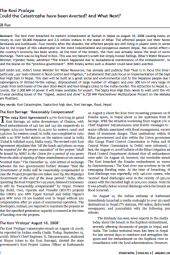The Koshi Pralaya: Could the Catastrophe have been Averted? And What Next?
Summary
In August 2008, the Kosi River breached its eastern embankment at Kushah in Nepal, resulting in severe devastation affecting over 50,000 Nepalese and 2.5 million Indians in Bihar. These individuals lost their homes, farmlands, and livelihoods and were forced to live in plastic tents even four months after the disaster. The catastrophe had a significant impact on the more industrialized and prosperous eastern Nepal, leading to severe economic consequences for the country. Importantly, the river's breach was not caused by a natural disaster, but rather by human negligence and inadequate maintenance of the embankment.
This report provides brief information on the catastrophe, if the catastrophe could have been prevented and the way forward to minimize risks in the future.
Categories:
Journal
Publisher:
Hydro Nepal: Journal of Water, Energy and Environment Issue No. 4
Published Year:
2009
